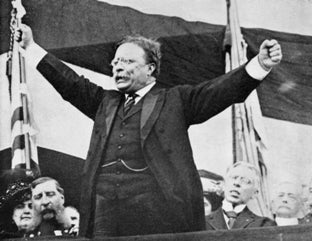Theodore Roosevelt, America’s 26th President, famously declared that the country ought to “speak softly and carry a big stick.” Good advice, especially in light of recent events. However, “when it came to the decibel level, [TR] did not always follow his own advice,” quips Jean Yarbrough in the latest “Makers of American Political Thought” paper from The Heritage Foundation.
And the volume of his rhetoric wasn’t the only place TR stumbled. Yarbrough, a professor of Social Sciences at Bowdoin College and the author of Theodore Roosevelt and the American Political Tradition, explains that TR was also the nation’s first “progressive” leader. “As President, he pushed executive powers to new limits, arguing that the rise of industrial capitalism had rendered limited government obsolete.”
For example, TR styled himself the “steward of the people.” This belief “unmoored presidential power from the Constitution and made it directly accountable to the people,” Yarbrough writes. “It is not uncommon today for progressives to give short shrift to constitutional questions or to cite phrases such as ‘We the people’ and ‘the general welfare’ rather than specific constitutional provisions to justify their proposals.”
Yarbrough details this evolution:
As a young Republican reformer, Roosevelt had agreed with the Framers that the task of the Constitution, and especially the courts, was to protect the rights of the individual from the tyranny of the majority. Now it was the corrupt “special interests” and party machines that rode roughshod over the majority. The people must tear down the barriers to their will and become their own masters. Not even the Constitution can be allowed to stand in their way.
Roosevelt remains relevant in 2012, the 100th anniversary of his failed presidential bid under the banner of the Progressive (often called the Bull Moose) party. His candidacy divided the Republican vote and allowed Woodrow Wilson to capture the White House.
And although he “returned to the Republican fold, Roosevelt continued until his death in January 1919 to press for Progressive reforms that would move the country closer to the social democracies of Europe. That was his goal, and it has remained the goal of Progressives ever since,” Yarbrough concludes.
That’s probably not the legacy TR would have dreamed of. But sometimes the change outlives the hope that gave birth to it.

































One Reply to “Theodore Roosevelt: Progressive Crusader”